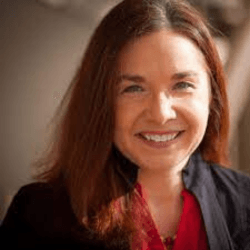Dr. Katharine Hayhoe (EEN Science Advisor)

Katharine Hayhoe is an atmospheric scientist who began her career with a B.Sc. in physics and astronomy from the University of Toronto. As she was finishing her degree, she took a class in climate science with Danny Harvey, who had previously been a postdoc at NCAR with Steve Schneider. There, she learned that climate change isn’t just an environmental issue – it’s a threat multiplier. It takes the most serious humanitarian issues confronting climate change today – hunger, poverty, lack of access to clean water, injustice, refugee crises and more – and it makes them worse.She later received her M.S. and Ph.D. in atmospheric science at the University of Illinois at Urbana-Champaign.
To date, her work has resulted in over 125 peer-reviewed papers, abstracts, and other publications and many key reports including the U.S. Global Change Research Program’s Second National Climate Assessment; the U.S. National Academy of Science report, Climate Stabilization Targets: Emissions, Concentrations, and Impacts over Decades to Millennia; the 2014 Third National Climate Assessment; the 2017 Climate Science Special Report; and the 2018 Fourth National Climate Assessment. In addition to these reports, she has led climate impact assessments for a broad cross-section of cities and regions, from Chicago to California and the U.S. Northeast. The findings of these studies have been presented before Congress, highlighted in briefings to state and federal agencies, and used as input to future planning by communities, states, and regions across the country.
Today, she is the Chief Scientist for The Nature Conservancy as well as a Paul Whitfield Horn Distinguished Professor and the Political Science Endowed Chair in Public Policy and Public Law in the Department of Political Science at Texas Tech University, where she is also an associate in the Public Health program of the Graduate School of Biomedical Sciences. She is a principal investigator for the Department of Interior’s South-Central Climate Adaptation Science Center and the National Science Foundation’s Global Infrastructure Climate Network. My research currently focuses on establishing a scientific basis for assessing the regional to local-scale impacts of climate change on human systems and the natural environment. To this end, I analyze observations, compare future scenarios, evaluate global and regional climate models, build and assess statistical downscaling models, and constantly strive to develop better ways of translating climate projections into information relevant to agriculture, ecosystems, energy, infrastructure, public health, and water resources.
Together with her husband Andrew Farley who is a pastor and a best-selling author, she wrote A Climate for Change: Global Warming Facts for Faith-Based Decisions, a book that untangles the complex science and tackles many long-held misconceptions about global warming.
She frequently gives public talks on climate science, impacts, communication, and faith. Her TED talk has over 4 million views and her latest books, Saving Us: A Climate Scientist’s Case for Hope and Healing in a Divided World (Simon & Schuster/One Signal) and Downscaling Techniques for High-Resolution Climate Projections: From Global Change to Local Impacts (Cambridge University Press), were both released in 2021.

